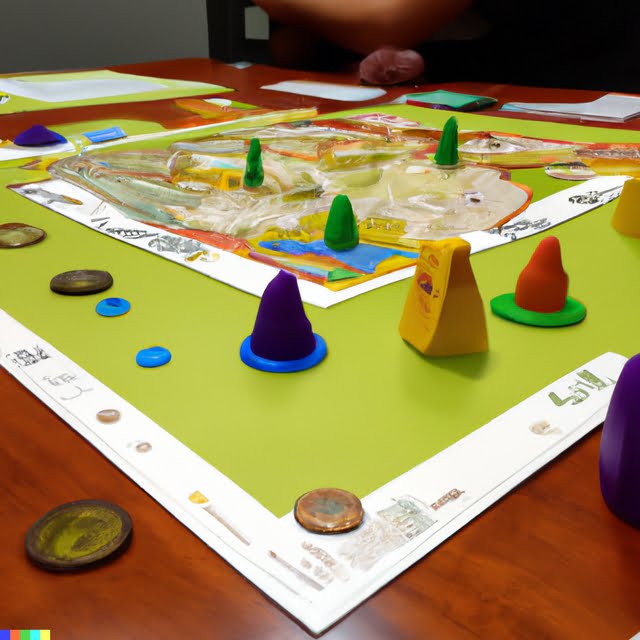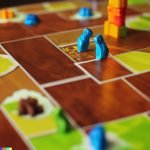Introduction
Board games offer us an exciting interactive way to play and learn. They provide an opportunity to exercise our mental and physical faculties while having fun. Board games challenge players to think critically and make decisions with consequences. Players are challenged to use problem-solving skills, logic and math skills, as well as decision-making abilities. Through board games, players also learn new vocabulary words, explore different cultures, practice strategic thinking policies and develop social interaction skills (e.g., negotiating, listening).
Expansion: Additional Skills Board Games Teach
Beyond these core educational benefits typically sought after when playing a game, research indicates that participating in family game night can create strong lifelong bonds because those who play together share more stories with each other than non-gamers do. Furthermore, board games teach important lessons about fairness in winning or losing scenarios”an attribute any successful leader must possess when navigating the corporate or political world. The harder we focus on a particular task or game, the better prepared we are not only for subsequent rounds but also activities in daily life such as exams or interviews; hence stressing the importance of continuing to learn new types of challenging activities over time in order to remain flexible and adaptable in the long run. Finally, board games help children learn how to roll with changes since no two rounds are ever perfect replicas of each other. The experience provides numerous opportunities for children to develop teamwork skills by making collaborative decisions during various situations that arise throughout a single round.
How Board Games Improve Cognitive Skills
Board games can be a great way to develop and enhance cognitive skills. Board games allow players to think critically, use problem-solving techniques, practice strategizing, foster creativity, and develop memory-building skills. Additionally, they can also help with interpreting and understanding rules and regulations as well as aid in the development of social skills.
Critical Thinking ” Many board games require players to think critically when deciding upon their moves. For example, some chess variants introduce added elements like additional pieces that must be factored in while selecting a move. Similarly, other strategy games can present different options that require deep thought processes before arriving at the best solution or outcome.
Problem-Solving ” Board games often include difficult puzzles or challenges that force participants to solve them in order to continue play. This could involve determining a cause for certain occurrences as well as deducing what lies ahead by studying past turns and subsequent outcomes.
Strategizing ” People have long used board games to sharpen their strategic mindsets. Chess is perhaps the most popular example of this where players continually try to outwit each other by capturing pieces in order to secure victory. Other multi-player strategy games also demand considerable forethought from all participating players throughout the course of play.
Creativity Expansion ” Not all board games require set strategies or patterns of play although many do present scenarios that benefit from creative solutions or outside-the-box thinking. Games like Scrabble encourage people to form unique words which then result in higher point totals but there are also plenty of non-word gaming variants requiring brains powered creativity just as much as any other game type does.
Memory Enhancement ” Most board game rules dictate one primary thing: remember them! Players must learn how to recall details about the rules plus remember exactly how every move taken moves affects future turns; Missed memory cues almost always lead to missed opportunities come later game rounds thus emphasizing the importance of memory enhancement rather significantly during most board gaming sessions!
Building Social Skills with Board Games
Board games are often more than just a way to pass time and have fun. Playing board games with family or friends can help teach essential social skills like how to graciously win and lose, how to manage stress levels and how to work together as a team. Board games can also foster communication skills that are transferable to larger life scenarios. Players must learn to listen, empathize and compromise amongst other players so collaboration and better outcomes can be achieved. Other fundamental relational skills such as divvying up tasks or duties in order to progress further in the game can also facilitate an understanding of leadership roles as well as fairness when interacting with others. Thinking ahead is also an important skill that is developed through board games as it helps players develop intuition and planning methods that allow them to strategize in order to make the most of their turn, ultimately leading them towards victory! Discouraging negative behavior such as excess competitiveness or talking over each other reinforces respect for one another and creates a bond between players as they take on board game challenges together. Knowing when it’s ok to take risks and when it’s important be conservative, feeds back into bigger real-life decisions too. And then, of course, having fun! Bringing laughter during the confusion and chaos of the game will encourage playtime with friends while prompting creativity among players to come up with new strategies during unforeseen challenges within the game
Boosting Problem-Solving Abilities through Board Games
Board games can be an excellent way for kids and adults alike to use their problem solving skills. As these games involve strategic thinking, it requires players to take into consideration all of the possible ways a game could pan out. By learning to anticipate different scenarios, players are pushing themselves to go beyond simply reacting spontaneously and instead rely on logic and strategy.
These problem-solving skills can also promote analytical thinking, such as sorting through incomplete information and recognizing patterns that may apply in either a current or future situation. This can help someone learn more effectively, spot discrepancies, and think more efficiently when presented with challenging situations.
Moreover, playing board games together is a great way to increase cooperative play through communication, discussion, debate and practice of fair play”which can teach good communication skills which help with navigating relationships in real life. Board games can also encourage cooperation between players who work together towards defeating a game or each other in teams; this teaches social skills like giving advice, making friendly competitions constructive and enjoyable for everyone involved. Additionally, by introducing mathematical concepts (such as probability) during these activities it helps to develop basic math abilities such as counting and tracking levels of resources over time. These types of activities not only prepare one for real-life decision-making but can also build confidence in the user’s ability to succeed at strategies which require decision-making skills. Finally, board games are incredibly entertaining which make them generally appealing”not just for their educational benefits!
Enhancing Emotional Intelligence with Board Games
Board games are often seen as a fun pastime, but they can also play an important role in helping children to develop their emotional intelligence. Through cooperating, strategising and socialising, board games offer invaluable lessons in self-awareness, self-regulation, empathy and resilience.
Playing board games encourages players to be more self-aware; they must think of how their actions will affect both them and their peers. As they take turns making moves on the gameboard, they learn that success often needs compromise as well as insight into other people’s feelings ” a critical component of shared emotion regulation.
Board games can also strengthen a child’s ability to empathise with others. Through interaction with others during the game, children become better able to read facial expressions and respond appropriately to emotions expressed by their fellow gamers. Board games allow children to practice behaviour like problem solving and maintaining calmness even in difficult moments and help them come up with ways of helping themselves or their opponents regulate their emotions so that the game can continue without upset.
Finally, playing board games helps kids learn resilience when experiencing challenging situations such as frustrating losses or unexpected outcomes”kids gain confidence in dealing with problems for which no one knows the answer by working together with players who take turns with equal importance . In this way, children learn how to value diverse opinions while keeping calm amid conflicting opinions or ideas ” all invaluable skills when it comes to life’s real time challenges now or when they become adults who have resposibilites beyond the surface level of just playing simple board games.
Unlocking Creativity and Imagination through Board Games
Board games teach children and adults alike many valuable skills. Some examples include strategic thinking, problem solving, logic, resource management and interactive social skills. In many board games, such as Settlers of Catan and Carcassonne, players must plan ahead by predicting opponents’ moves in order to maximize their success. Resource management is essential in these games ” too much or too little resources can quickly lead to a player’s downfall! Board games are also excellent for teaching analytical skills: players must carefully weigh the odds when choosing between multiple strategies in order to choose the best one. In addition to this, board games often help players unlock hidden levels of creativity. Through token placement and improvisation they are able to come up with “outside-the-box” solutions that may not have been available before. This allows players to mount challenges no matter what the situation they find themselves faced with. Whether it is during game night at home or while exploring rules and regulations on vacation, board games open up vast new avenues of individual expression. Through inventive play and rising difficulty levels, a person’s imagination can take flight ” creating remarkable experiences never thought possible.
Understanding Teamwork and Cooperation through Board Games
Board games are an excellent way to teach children important skills such as teamwork and cooperation. Through board games, kids can learn how to work together, think strategically, and rely on one another””all crucial components of team-oriented activities. As they interact with the game pieces and each other, players are challenged to think through different possible scenarios and develop a plan for playing cooperatively in order to win the game. By working together during the game play, the group is able to create a strategy that helps them achieve their joint goal: winning the game!
In addition, board games help foster problem-solving qualities. During gameplay, children are challenged to decide which strategies will help them advance while avoiding problems or obstacles that might impede their progress. This teaches children analytical thinking that they may be able to apply in many different real-life settings. Board games also encourage creativity in problem solving as players must come up with innovative solutions for any issues that arise during the game. Such activities allow children to practice strategizing for potential conflicts ahead of time rather than responding reactively as situations arise during gameplay.
On top of teaching teamwork and cooperation, board games can help strengthen communication skills by encouraging turn taking and listening attentively when others are speaking””two skills critical for effective collaboration within a team or group setting. Furthermore, board games help build self-confidence as participants gain assurance from mastering complex rules and strategy associated with game play. Finally, social interactions become more meaningful when shared within an enjoyable activity like a board game””encouraging children’s sense of belonging through joint experiences enjoyed amongst family members and friends.
Developing Strategy and Critical Thinking through Board Games
Board games can be an effective way to teach a range of skills to children and adults. Through the course of game play, they promote creativity, problem-solving, and logical thinking. As players engage in game play, they must make informed decisions that will impact their strategies and outcomes. Additionally, board games encourage collaboration and cooperation as players work together to achieve success.
Strategy and critical thinking are some of the most important skills practiced through board games. Decisions must be made with consideration for other players’ actions within the game. This means that each move must be carefully planned according to rules and objectives while anticipating any potential obstacles or challenges that may arise in the game. Furthermore, analyzing opponent’s moves helps players develop a better understanding of tactics by considering the advantages and disadvantages of their own strategies compared to others’. Players must also think ahead to plan effectively for future turns which requires breaking down long-term goals into short term steps. All of these strategic approaches can easily be transferred into real life scenarios to assess risk versus reward, identify consequences or develop efficient solutions for complex problems.
Finally, board games provide an opportunity for collaboration as all players must rely on working together as a team in order to succeed at the game. This helps build communication skills such as showing respect for other opinions, asking meaningful questions or contributing constructive suggestions regarding potential moves. Working together also encourages social interaction between people allowing them to share ideas and experiences while having fun at the same time!
Nurturing Patience and Resilience through Board Games
Board games teach a wide range of skills to those who play them, particularly when it comes to patience and resilience. Players must wait their turn in order to move around the board and they often have to practice patience while waiting for the other players to finish their turns. In addition, players have to endure resiliently as they face obstacles when trying to reach a certain square or find a specific item. Learning how to be patient and resilient through playing board games will benefit children throughout their lives, as these two qualities can help them handle challenging situations that life presents.
Improvement of Strategic Thinking Skills with Board Games
Board games also help improve strategic thinking skills. To reach the goal in most board games, players must be cognitively aware of the current situation, assess what pieces are still in contention, recalculate old strategies that no longer work and develop new ones on the fly. This process helps children learn how to plan ahead and consider outcomes that might result from potential choices before making decisions. By teaching kids how to think strategically about both present and future scenarios, board games can provide lifelong benefits such as problem-solving abilities and creativity skills development.
Sharpening Creative Problem Solving Skills through Board Games
Finally, by developing creative solutions while playing board games children can hone their problem solving skills which will come in handy throughout adulthood too. For instance, figuring out possible routes on the game board that could lead them to victory may encourage kids to approach issues outside of checkers or monopoly with an open frame of mind. In this way, they can learn several approaches they can use when faced with uncertainty while being encouraged by progress made within an entertaining framework where mistakes are not punished but rather celebrated as learning opportunities.
Conclusion
Board games can provide a great way for people of all ages to interact, learn important skills, and have fun. One benefit of playing board games is that it promotes social development by allowing participants to work together in creative problem-solving. It also encourages turn taking, decision making, interpersonal communication, and compromise.
By requiring players to focus their attention on the game and quickly think strategically, board games also help improve cognitive functions such as memory, concentration, and visual perception. Board games can also help develop math skills using logic and critical thinking. Players must make decisions based on direct influence from the game rules, scores on board counters or cards from spinning machines or dice rolls to form the best possible move in a given situation.
Overall, board games provide a healthy platform to exercise your mind while having fun with friends and family. Playing board games builds patience as players wait their turn; instills trust within relationships as everyone follows agreed upon rules; cultivates negotiation skills when bargaining price of goods; develops planning/sequencing skills when playing cooperative/competitive puzzles; increases emotional intelligence due to gaming etiquette; simulates real life application when making purchases or trading assets; and longer attention spans while trying to reach an ultimate goal. These skills can be transferred off the board into a person’s daily life routines giving them improved problem-solving abilities and better understanding of consequences related to decision making processes. As such board games are excellent tools that teach life-long skills which if applied in everyday situations will no doubt lead to success in both professional & personal lives.

I love playing all kinds of games – from classics like Monopoly to modern favourites like Ticket to Ride.
I created this blog as a way to share my love of board games with others, and provide information on the latest releases and news in the industry.





